Robber J.A. Crossley Asks to be Kept in the Oregon State Penitentiary
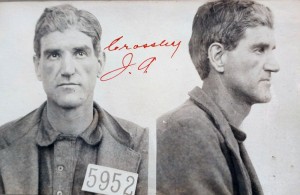
Mugshot of J.A. Crossley after his arrest in 1909. Photo Source: Oregon State Archives, Department of Corrections, Oregon State Penitentiary Inmate Case Files. Accession No. 94A-7. Box 16.
By Kylie Pine
When faced with the chance of freedom after long confinement at the Oregon State Penitentiary, most prisoners might look forward with great anticipation to their release. That wasn’t the case for J.A. Crossley when he was granted parole on Friday, October 13, 1911. Per a small article in Capital Journal, it appears he “asked to be permitted to stay in one day longer. He had just $23 in pocket, and it was Friday, the 13th of the month, with a comet in sight. He thought the combination too heavy for him to tackle.”[1] At first I was pretty incredulous, but further digging revealed facts that documented the newspaper account and told the very interesting story of Crossley’s criminal activities across Oregon over 100 years ago.
The Oregonian, in a corroborating article, stated “[Crossley] considered the ill-omened “23” bad enough, but with the added complications of Friday and the 13th day he was insistent that he be allowed to remain over a day.”[2] Crossley was eventually persuaded to leave by a parole officer on the 13th, a fact supported by a hand written notation in red ink beneath a blue “Paroled” stamp in the Oregon State Penitentiary Register at the Oregon State Archives.[3] The Oregonian reports that Crossley was sent to live with an uncle in Louisiana. Unfortunately, this is where the document trail goes cold and we may never really know if his superstitions came to pass.[4]
We can, however, wade our way through a series of aliases and put together a pretty clear picture of Crossley’s criminal exploits. When unluckily paroled in
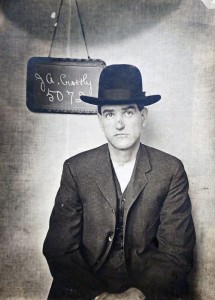
Mugshot of J.A. Crossley after his first arrest in 1905. Photo Source: Oregon State Archives, Department of Corrections, Oregon State Penitentiary Inmate Case Files. Accession No. 94A-7. Box 13.
1911, he was two years into a seven-year sentence for “larceny in a store,” a result of his involvement in blowing up a safe in and then setting fire to a store in Weston, Oregon near Pendleton.[5] In a scene that would read right out of a movie, Crossley (then going under the alias J.A. Murray) and two associates broke into the Sim Culley’s store and blew up the safe. Accounts differ, either the explosion led to a fire that caused $5,000 worth of damage, or the burglars sought revenge after only finding $5 of loot in the safe and intentionally set the blaze. The burglars then made their escape on a railroad handcar (imagine pretty much every cartoon you have ever seen) they had stolen from the nearby station and led the sheriff and his deputy on a 24-hour chase through several counties and two states before getting caught at Wallula.[6]
This was not Crossley’s first run in with the law. He was convicted of a similar heist at a bank in Lebanon, Oregon in 1905 for which he received a five-year sentence at the Oregon State Penitentiary. The M.O. was the same: blow up the safe, take the money, escape on a handcar. Operating under the alias Harry Reynolds with the cover story that he was scouting a location to build a new saloon, Crossley and three accomplices crept through town early on the morning of February 7th, picked the lock on the bank’s front door, blew open the “burglar proof chest,” took between $5,000-8,000, and fled on stolen railroad velocipedes. Accounts and testimony at the trial vary widely, but the four appear to split soon after the break-in, taking different trains to different locations to try to throw of the scent of pursuit. Ironically, the testimony indicates that talked to (and ate with) a lot of people along the way. Crossley ended up in Portland where he unwisely boasted to Minnie Schultz of Portland, showing her a mutilated gold coin “which had been battered by the force of the explosion.”[7] Crossley and one accomplice were picked up in Portland, tried and convicted.
Their other accomplices, later identified as the notorious James Johnson a.k.a. Toronto Jimmy and the jail busting “cracksman and bank burglar” William “Doc” Davenport escaped capture. [8] Toronto Jimmy, the purported leader of the gang, was “known to every detective in the United States.” The gang was credited for several crimes including a Newberg bank robbery and the hold up of an Oregon & Railroad and Navigation Train at Sullivan’s Gulch. Toronto Jimmy was a smooth customer and the papers were quick to point out that he bamboozled his way into “the most exclusive society of Portland…under another name [he] played golf and cricket with some of the most prominent men of Portland.” Unlike Crossley, Toronto Jimmy eluded capture until 1908, when he was picked up on the streets of Cincinnati. [9]
Little is known about Crossley’s early life. One newspaper account claims he was a notorious pickpocket from St. Louis.[10] Census and booking records indicate he was born in Kentucky in about 1870, was single, protestant and worked at various times as a railroad switchman.[11] As a prisoner he was apparently well behaved. One notice claims that he and his fellow accomplice had made the “good prisoner’s list” and spent most of his time working as an “oiler in the pump house.”[12] His conduct was good enough to merit a year and a half reduction to his first sentence.[13]
This article originally appeared in the October 8, 2017 edition of the Statesman Journal. It is reproduced here with citations for reference purposes.
Excerpts from Primary Source Materials
Bold Bank Robbery
Capital Journal, 8 February 1905
Four cracksman dynamited the vaults of the Lebanon bank last night, and secured $8000 and escaped, going down the railway several miles on a velocipede, to where their horses were concealed. The lock of the front door was picked. They blew the entire front of the safe out and gathered the coin in sacks. A posse is in pursuit.
Fails to get Out
Oregonian, 15 February 1905, page 10
J.A. Crossley, alias Harry Reynolds, one of the men held in the County Jail on suspicion of having been implicated in the Lebanon Bank robbery was brought before Judge George yesterday in response to a petition for a write of habeas corpus….The sheriff also exhibited to the court a number of $20 pieces which have a battered appearance. This, he explained, was caused by the effects of the explosion of the bank vault. This money, amounting altogether to $900, was obtained from Mrs. Robert Schulze, wife of a saloonkeeper at the corner of Second and Clay streets. Crossley was arrested at 313 Second street, which is close by this saloon. After examining the return of the Sheriff….
Guilty of Robbery
Oregonian, 17 March 1905
Dunn and Crossley Broke Open Lebanon Bank.
The Jury quickly Decides
Kingsley and Darland, Two members of the Gang who escaped, also found guilty, as charged in the indictment.
Eli Dunn and J.A. Crossley, alias Reynolds, were found guilty of robbing the bank of Lebanon the night of February 7 in the Circuit Court here tonight. The jury was out an hour and 30 minutes before returning with the verdict. Judge Burnett will impose sentence Monday at 1 o’clock.
John Doe and Richard Roe (Kingsley and Darland), who escaped capture, were also found guilty as charged in the information.
The Defense concluded the presentation of its testimony at 2:30 o’clock this afternoon, after placing several witnesses on the stand to prove an alibi for Dunn and showing that Crossley had plenty of money before the bank robbery. The remainder of the afternoon was given over to the pleas of the attorneys.
Deputy District Attorney Gale S. Hill spoke for the prosecution and was followed by George W. Wright and John Ditchburn for the defense. A recess was then taken until 7 o’clock tonight, when District Attorney John H. McNary concluded the case for the state. The case was given to the jury at 8:25 o’clock and the verdict guilty as charged was returned at 9:45.
The testimony introduced in the trial of J.A. Crossley, alias Reynolds, and Eli Dunn, charged with the Lebanon Bank robbery, is rather conflicting. The prosecution used a strong chain of evidence to prove that the robbery was committed by four men, who walked from Albany to Lebanon the evening of the robbery, came back to this city on railroad tricycles stolen from Southern Pacific section gangs between Albany and Lebanon, made their way “across country” to the West Side Railroad and took the northbound Portland-Corvallis train at different stations on the afternoon following the night of the robbery.
The evidence introduced goes to show that these four men were Crossley, Dunn, Kingsley, and Darling. The two former, who are the defendants in the present trial and are prisoners here, have been identified by several witnesses, who saw them at Albany and at different places on the West Side, and the description the witnesses have given of their companions tally with the published descriptions of Kingsley and Darling.
The defense, in its testimony, admitted that Crossley was in Albany and at the other places, where the witnesses for the prosecution have identified him, but denied he was ever in or near Lebanon, and alleged he was up the valley on business. Dunn, the defense alleged, was in Portland when the robbery was committed, and the attorneys for the defendants attempted to prove an alibi for him. Dunn and Crossley both admit they were in Albany together early in February, but deny ever being associated with any man answering the description of Kingsley and Darling.
The introduction of testimony began yesterday afternoon and the evidence introduced by the attorneys for the prosecution was as follows:
Dunn, Crossley, and two other strangers were shown to have been in Albany together on the afternoon of February 7, the robbery being committed that night. The two former were also in Albay for two days several days before the robbery. F. M. Pomeroy stated that February 3, and again on the 4th, Dunn and Crossley, accompanied by another man, were in his saloon near the Southern Pacific depot in this city. Crossley was in the saloon again the following Monday and Tuesday (the robbery occurred Tuesday night), and Dunn was there several times, playing cards. He was positive as to the identity of both men.
W.H. Mihollen, of Portland, saw Dunn and Kingsley on the streets in Albany on the afternoon of February 7th. He was acquainted with both men in Portland and positively identified Dunn. Other witnesses saw one or both of the prisoners in this city at that time and several were positive of their identification of Dunn.
Employees of the Lebanon train testified that they saw four men, walking along the track about two miles from Albany going toward Lebanon on the afternoon of February 7th. The men were well dressed and strolling along leisurely without any apparent purpose in view, two of them about 30 yards ahead of the other two. The trainmen gave an exact description of Kingsley, they having noticed him more particularly than the others because of his striking appearance. Dunn and Crossley answered the general description of two of the men, but they could not positively identify the two prisoners. The testimony showed that two railroad tricycles were stolen that night from section gangs between Albany and Lebanon. Mrs. G. W. Cheshire, living near the Lebanon Bank, heard men passing her house several times during the night of February 7. She looked out the window and saw four men carrying sacks on their shoulders and supposed some crime was being committed, but was at home alone and could not give an alarm.
Mrs. M.J. Prosser, of Lebanon, heard men pasing[sic] passing her house several times at a late hour the same night.
About 3:30 o’clock on the morning of February 8, N. E. Manley of Tallman saw a railroad velocipede pass that station rapidly. J.E. Skleey heard a velocipede pass his house at Goldra station some time early that morning. Testimony was introduced showing that two railroad velocipedes were found in the Santiam Canal newar where the Southern Pacific track crosses it on the outskirts of Albany on the forenoon of February 8.
Jacob Weiss testified that he found a revolver on the Lebanon railroad early on the morning following the robbery, and evidence was introduced showing that it exactly fitted in every respect an empty pistol holster found on Crossley when he was arrested. Mrs. Minnie Schultz, of Portland, received from Reynolds, now known as Crossley, a mutilated gold coin, which resembled in appearance money picked up in the bank after the robbery, and which had been battered by the force of the explosion.
James Johnston, a resident of Benton County, living on the road from Albany to Wells Station, saw four men pass his house walking along the road, about 8 o’clock on the morning of February 8. One carried a grip, and he was almost positive that Crossley was one of them.
Different witnesses testified to seeing Dunn and a man answering the description of Darling at Wells Station the afternoon of February 8. Dunn, who was positively identified by different witnesses, carried a grip. The two men ate dinner at the home of Mrs. Ella Williamson, who identified Dunn and described his companion exactly like the published descriptions of Darling. Both men bought tickets at Wells for Portland, taking the afternoon train.
Other witnesses saw men answering descriptions of Crossley and Kingsley on the road from Wells to Suver. Crossley went into a store at Suver, bout some soda water and stayed some time, saying he was from Albany. Two witnesses identified him. Kingsley remained at Suver an took the train for Portland there while Crossley went on to Parker and boarded the same train at that station. He ate dinner that day at the home of Mrs. Julia A. Boone, at Parker, who identified him.
Sheriff Tom Word and Deputies Harvey L. Moreland and J.S. Downey, of Multnomah County, testified regarding the arrest and searching of the prisoners, and gave different facts connecting them with the crime. The introduction of the state’s evidence was concluded when court adjourned last evening.
The defense began their presentation of their testimony this morning. Dunn himself was the first witness. He said he and Crossley were in Albany the 3d and 4th of February. Crossley was looking for a good location for a saloon, and he was to work for Crossley. He returned to Portland on the afternoon train, February 4, he said and had not been in Albany since then until he was arrested. He had never been in Lebanon, and did not know men answering to the names or descriptions of Kingsley or Darling.
A.G. Hendryx, father of Mrs. Dunn, was the second witness. He swore Dunn was in Portland the night of the robbery, and was at home all evening.
Elijah Hawkins, an ex-Army Captain, and his son, Fred Hawkins, a cement contractor both of Portland, testified to seeing Dunn in Portland the day the robbery was committed. D. M. Sterling, a marine engineer, now employed as a carpenter at the Lewis and Clark Fair Grounds, also saw Dunn in Portland February 8.
Charles Dell, an employee in Blazier’s saloon, in Portland, testified that Dunn had played pool with him in Blazier’s all afternoon of February 8, during the same time that the prosecution alleged he was at Wells Station and on the train on his way from there to Portland.
Mrs. Eli Dunn was the next witness. She swore Dunn was in Portland the night of the robbery, but under a rigid cross-examination, she finally was forced to admit that she did not spend the night of February 7 at home, thus showing a discrepancy between her statements and the testimony of her father, Hendryx, who swore both Mr. and Mrs. Dunn were at home that night, taking care of him when he was ill.
J.A. Crossley took the stand and corroborated Dunn’s testimony regarding their business in Albany February 3 and 4. He was in Albany again February 7, and was here the night of the robbery, but was not with Dunn that night nor with Kingsley and Darling, whom he did not know. He walked from Albany to Suver the next forenoon alone, and admitted the statements of the prosecution that he was in a store at Suver and ate dinner at Parker Station that day. He said he took the train at Parker, intending to stop at independence, looking for his saloon location, but changed his mind after getting on the train, and went on to Portland. He denied all connection with the robbery.
The examination of witnesses for the defense was continued this afternoon. Great interest was taken in the trial, and the courtroom was so crowded today that people had to be refused admittance. Hon. O.F. Paxton , of Portland, was called to assist the attorneys and the state, and J.F. Watts of Portland, was added to the list of counsel for the defendants.
Lebanon Robbers’ Known to Police
Oregon Journal, 5 July 1905, page 5
Portland Authorities say they have full information concerning the thieves.
Also asserted that same crew was responsible for the Newberg Crime.
Not only do the police now profess to have full information as to the identity of all the men responsible for the Lebanon bank robbery, but they assert that the same persons committed the Newberg bank robbery, obtaining $5,000, and attempted to loot the bank at Sheridan.
J.F. Kingsley, one of the robbers who escaped is said to be James Johnson, alias “Toronto Jimmy” a noted bank cracksman, who broke jail at Rochester Minnesota, May 30, 1903, and for whose capture a reward of $250 was offered.
Darling, the other criminal who escaped, is said to be William, alias “Doc” Davenport, a noted cracksman and bank burglar. He, too, broke jail at Memphis Tennessee with two companions in crime, May 29, 1903. The tools with which they broke jail were furnished to them by George Stratton, a mailbox robber who was afterward sentenced from Denver, Colorado, to serve 21 years in the Canyon City penitentiary for robbing the United States mails. Stratton escaped with two companions, both of whom were captured and lynched. Stratton is still at large.
Crossley, one of the convicted Lebanon bank robbers, is a St. Louis pickpocket. Eli Dunn is said to have been a “capper” for two years for a poker game at the Maze café. Dunn’s wife is a sister of Dora Williams, a noted female thief, who was recently in Portland with Robert Robertson, a criminal of many aliases, best known as “the Gorilla” both being forced to leave town between two suns by Sheriff Word.
The Police are positive that their assertion that neither of the Lebanon bank robbers who escaped clutches of the authorities is at Seattle.
Pictures of Johnson and Davenport and accounts of their exploits as crooks are given in The Detective, a Chicago Publication devoted to the interests of police and sheriffs, under the date of July 1, 1903. A copy of this publication has been secured by the police.
Bank Robbers Good Prisoners
Oregon Journal, 14 April 1906, page 16
J.A. Crossley and Eli Dunn, members of the Kingsley gang of bank robbers and highwaymen, which was run out of the northwest by Sheriff Word, are on the “good prisoners” list. Crossley and Dunn were arrested in Portland a year ago by Sheriff Word and his deputies, but were sent to the penitentiary for five years each for having robbed the Lebanon bank. Crossley is oiler in the pump house and Dunn is foreman of the tin shop. Both declare they know nothing of the whereabouts of Kingsley.
Oregon Robbers Taken
Oregonian, 14 Decmber 1908
Hold up men who operated here are caught.
Two arrested in Cincinnati Believed to have turned tricks about Portland.
Local officers and detectives have been reminded of the big Lebanon bank robbery and the holdup of the O.R.&.N. train in Sullivan’s Gulch by the recent arrest at Cincinnati of George Carroll and Matthew Willard and the recent release from the Oregon Penitentiary of Eli Dunn and J.A. Crossley.
It was these four men, according to the officers, who commited the sensational bank robbery at Lebanon and the still more senasational holdup of the O.R.& N. Train. And they are said to be the most expert and successful safecrackers in America.
Willard, said to be the leader of the gang, has among other aliases, that of “Toronto Jimmy” by which he is known to every detective in the United States. With Carroll he was picked up on the streets of Cincinnati, October 14, by four detectives who recognized them from their photographs.
It was while operating in the Pacific Northwest that “Toronto Jimmy” broke into the most exclusive society of Portland. None of the gang’s safeblowing jobs were pulled off in Portland, but in the neighboring towns, including Lebanon, Hood River, Troutdale and other places. Large sums of plunder were secured, and the robbers made their home in Portland. During that period, according to O.R. & N. detectives and others, “Toronto Jimmy” under another name played golf and cricket with some of the most prominent men of Portland.
Soon after the train holdup the officers succeeded in gaining a good clew which pointed to the four men as responsible for the numerous crimes. Willard and Carroll learned of what the officers had found out, and with the aid of a woman escaped from the city in an automobile, driving to Linnton, where they boarded the train and escaped.
Dunn and Crossley were captured, tried and sentenced to the Penitentiary. They were released last month, having served the period of time to which they were sentenced.
Hoodoo Worries Convict
Oregonian, 11 October 1911, pg 1
With $23 in pocket paroled Prisoner would stay in “Pen” on 13th.
Salem Or. Oct 13 (special) Because he had $23 in his pocket and because Friday is the 13th day of the month, J.A. Crossley, paroled convict, balked at leaving the State Penitentiary today. He considered the illomened “23” bad enough, but with the added complications of Friday and the 13th day he was insistent that he be allowed to remain over a day.
Parole Officer Bauer, however, persuaded him to leave. He is going to Louisiana, where he has been paroled to an uncle. Crossley was sent to the prison from Eastern Oregon for larceny from a dwelling.
In other News…
Capital Journal, 19 October 1911
J.A. Crossley was paroled from the pen Friday, but asked to be permitted to stay in one day longer. He had just $23 in pocket, and it was Friday, the 13th of the month, with a comet in sight. He thought the combination too heavy for him to tackle.
Citations
[1] Daily Capital journal. 19 October 1911. Accessed via the Oregon Historic Newspapers Project.
[2] “Hoodoo Worries Convict” Oregonian. 14 October 1911, pg 1. Accessed via the Oregon Historic Newspaper Project.
[3] Oregon State Penitentiary Inmate Registers. Entry for prisoner number 5952. Department of Corrections Records, Oregon State Archives. Found in reference room. Record description: http://arcweb.sos.state.or.us/pages/records/state/odc/series/inmate_reg.html
[4] “Hoodoo Worries Convict” Oregonian. 14 October 1911, pg 1. Accessed via the Oregon Historic Newspaper Project. N.B. We have found a couple of potential connections. There is a Joseph A. Crossley about the right age that dies in Louisiana on January 6, 1925 is a possibility. There is a 1914 City Directory entry for a Joseph A. Crossley in Alexandria, LA living at same address as a Jessie Crossley and a Lee and Pinkie Crossley. Also a possibility. However, without more concrete details or a way to pin down J.A.’s actual birth name, nor assurances that J.A. Crossley is not one of his many aliases, the search seems a little hopeless.
[5] Oregon State Penitentiary Inmate Registers. Entry for prisoner number 5952. Department of Corrections Records, Oregon State Archives. Found in reference room. Record description: http://arcweb.sos.state.or.us/pages/records/state/odc/series/inmate_reg.html;
Inmate Case Files. Oregon State Penitentiary. Department of Corrections. Oregon State Archives. Accession No. 94A-7. Box 16. Case file for inmate 5952 – J.A. Crossley.
“Returns New Indictments.” East Oregonian. 26 May 1909, page 1. Accessed via Historic Oregon Newspapers.
“Men Under Arrest prove ex-convicts.” East Oregonian. 3 May 1909, page 1. Accessed via the Oregon Historic Newspaper Project.
[6] “Burglars are Taken.” Eastern Oregonian. 26 April 1909, pg 1. Accessed via Historic Oregon Newspapers.
“Taken after a Chase.” Oregonian 27 April 1909, page 4. Accessed via Historic Oregon Newspapers.
[7] “Bold Bank Robbery-Lebanon.” Capital Journal. 8 Feb 1905, page 1. Accessed via Historic Oregon Newspapers.
“Robbers in Prison.” Oregonian. 21 March 1905, page 4. Accessed via Historic Oregon Newspapers.
“Guilty of Robbery” Oregonian. 17 Mar 1905, page 6. Accessed via Historic Oregon Newspapers.
N.B. the amount of money varies throughout the accounts.
[8] “Lebanon Robbers’ Known to Police.” Oregon Journal. 5 July 1905. Accessed via Historic Oregon Newspapers.
[9] “Oregon Robbers Taken.” Oregonian. 14 December 1908. Accessed via Historic Oregon Newspapers.
“Lebanon Robbers’ Known to Police.” Oregon Journal. 5 July 1905. Accessed via Historic Oregon Newspapers.
[10] “Lebanon Robbers’ Known to Police.” Oregon Journal. 5 July 1905. Accessed via Historic Oregon Newspapers.
[11] 1910 US Federal Census – enumerated at the Oregon State Penitentiary in Salem, Oregon. Inmate Register and Case Files, Oregon State Penitentiary Records, Department of Corrections, Oregon State Archives.
[12] “Bank Robbers Good Prisoners.” Oregon Daily Journal. 14 April 1906. Accessed via Historic Oregon Newspapers.
[13] Inmate Register, Oregon State Penitentiary Records, Department of Corrections, Oregon State Archives shows he was booked into OSP on his first conviction March 20, 1905 and released October 20, 1908 on a five year sentence.



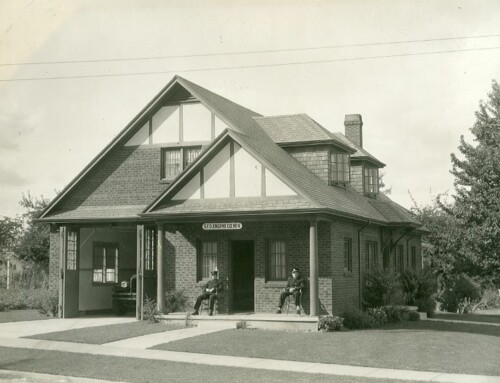
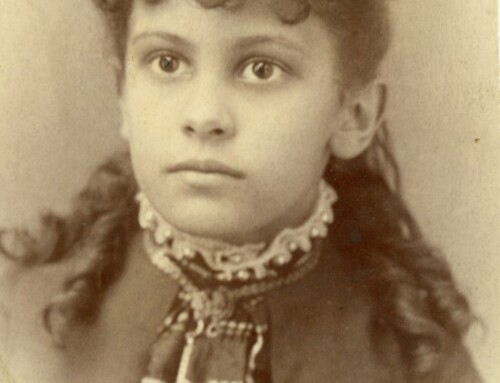
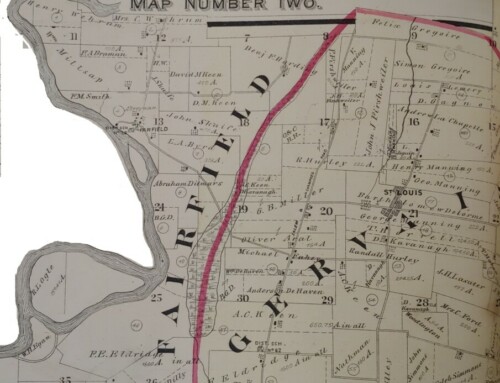
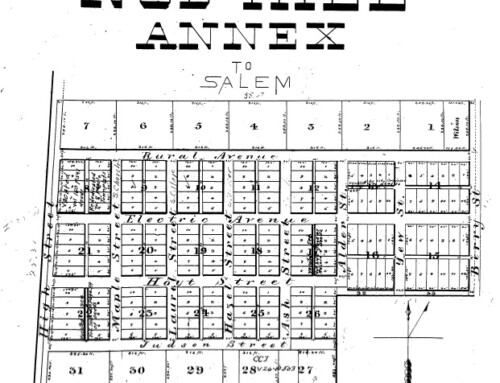
Leave A Comment